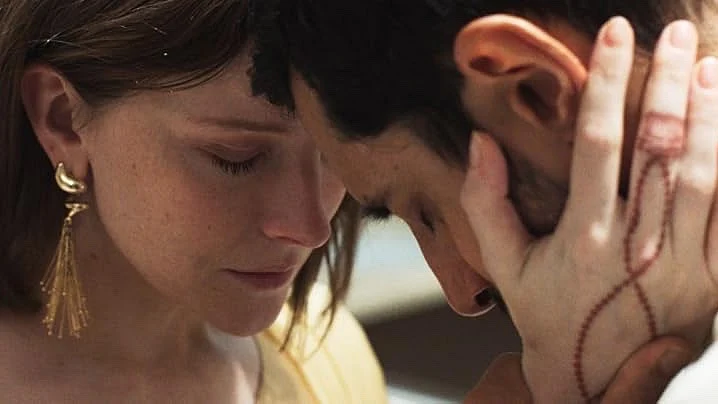
Summary of this article
Hamlet (2025) is directed by Aneil Karia.
The adaptation features Riz Ahmed (as Hamlet), alongside Morfydd Clark, Sheeba Chaddha, Joe Alwyn amongst many others.
It premiered at the Telluride Film Festival on 30 August 2025.
Directed by Aniel Karia, Hamlet (2025) is a modern adaptation of William Shakespeare’s classic tragedy set in modern-day London. Written by screenwriter and playwright Michael Lesslie, adapting the play has long been a passion project for its star Riz Ahmed. Taking the audience into South London’s South-Asian community, Karia’s Hamlet showcases dynasty politics and family turmoil using Shakespeare’s exact verses (remixed, of course). The film’s form is jarring and it takes a while to adjust to people talking in verses. Imagine a grief-struck Riz Ahmed (who also speaks Hindustani) and a 21st century South-Asian household spitting old-English to and around what’s majorly a brown people. But once you give into the illusion, the film flows surprisingly well—a novel approach that feels authentic.
A study in frenzied action, Ahmed’s Hamlet wears his grief on his face with wide-eyed anxiety, unsure of his world and truth after the passing of his father, Old Hamlet (Avijit Dutt). Hamlet is a walking time-bomb; a tense feeling of all-will-blow-up (or he will) runs throughout the film. Complementing Ahmed’s earnest portrayal is an ensemble cast with Sheeba Chaddha as Gertrude, Art Malik as Claudius, Joe Alwyn as Laertes, Morfydd Clark as Ophelia and Timothy Spall as Polonius.
Rather than Prince of Denmark, Hamlet here is heir to a dynasty he doesn’t want, whose workings he doesn’t really understand. Upon returning to London, he’s tormented with finding the truth about his father’s death, especially since the ghost of Old Hamlet visits him one night, after a short stint with psychedelics. Here, Hamlet chases his hallucination desperately, almost as if wishing for the ghost to appear more than the dead father himself. His obsession serves the desire to give his pain meaning, if only so he can navigate it, even if that path goes through revenge driven by madness.
Hamlet is surrounded by people operating on various degrees of madness; forming a manic synergy that keeps him on edge at all times. This treatment adds a deliciously urgent texture to the film, where Hamlet inhabits one world and the rest of the characters another. Even time seems different. Hamlet's temporal space is disjointedly continuous, folding into itself while every other character moves at a “normal” pace. When his mother and uncle, Gertrude and Claudius, go through their wedding preparations, Hamlet feels ridiculed and appalled at their swiftness. He’s stuck. Time holds no meaning for him. Death and grief mix with wedding and shenanigans.
The sangeet ceremony fits nicely into this desi adaptation as Hamlet is determined to know if Claudius killed Old Hamlet. And what better way to discover truth than a poignant dance performance? Personally, I’d be traumatised if someone performed that dance at any wedding—upstaging others and leaving everyone weirded out and confused. But, in the quest for truth, Hamlet’s mania doesn’t care or allow for embarrassment.
The son cannot reign it in, the mother cannot let a whiff out. Wonderfully restraining chaos and madness, Chaddha’s eyes communicate more than words. One is inclined to compare Chaddha’s Gertrude with Tabu’s Ghazala in Haider (2014). Ghazala’s turmoil is weaved into the plot, inseparable from Haider’s story, but Gertrude’s madness meanders—always knowing, always watching, always present, but always held back. So, when she meets her fate in order to save her son, it holds immense, intimate power. We know that her indifference is a farce; her love for Hamlet cannot stand betrayal.
Joe Alwyn and Morfydd Clark, white actors amidst a predominantly brown cast, belong to the world but as misfits. This is a good thing. As Ophelia is constantly subjected to Hamlet's whimsies, oscillating between “does he love me, does he not”, the chemistry between Ahmed and Clark is surprising, as is the calm presence of Joe Alwyn which turns on itself as he joins forces with Claudius to plot against Hamlet.
Hamlet has the same immediacy as Karia’s Oscar-winning short film The Long Goodbye (2020), co-created by and starring Riz Ahmed, where a group of racist vigilantes round up and kill brown people as their immediate world watches. A shot down Rizwan stands up as he raps, reciting his pain in verses, facing the camera directly. Oddly, it seems as though Hamlet picks up where The Long Goodbye ends—not in terms of story, but in terms of them belonging to one universe.
It is evident that the duo are trying to reinstate their voices, and making their space in a white world. The film doesn’t make overt allusions to their society but this revision, this very attempt of retelling is obviously political. It’s important for artists to acclimatise themselves and tell diverse stories without having to centre their pain and struggles always. Here, they are concerned with sharing their real lives amidst London, inner struggles, power dynamics and a search for peace that don’t seem relatable, but truly are. What better way to do that than taking a classic and adapting it into a South Asian setting; democraticising the elite connotations attached to Shakespeare and making it accessible artistically? Broken and rough, Hamlet’s journey is an honest attempt at the eternal question bothering immigrant, brown voices: to be or not to be?
The answer is, we must.























